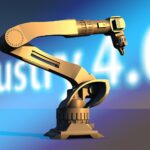EITN speaks with Software AG, an enterprise software vendor which is headquartered at where Industry 4.0 originated, and is right smack in the middle of where Industry 4.0 is unfolding rapidly – Germany.  Software
Software
Mark Fitzsimons, is Software AG’s VP of IoT Centre of Excellence in APJ. He has over 20 years’ experience including leadership roles in companies like Infor and Oracle.
EITN: From Software AG’s point of view, what is Industry 4.0? What are the enabling technologies for it, if any?
Fitzsimons: Industry 4.0 describes the current trend of automation and data exchange in manufacturing technologies which includes cyber-physical systems, the Internet of Things (IoT), cloud computing and cognitive computing.
Industry 4.0 is paving the way for the “smart factory of the future,” where cyber-physical systems monitor physical processes, create virtual copies of the physical world and make decentralized decisions. Over IoT, systems communicate and cooperate with each other and manufacturing personnel in real-time both internally and across organized services offered and used by those in the value chain.
We see that most manufacturers are eager to harness the power of Industry 4.0 to drive innovation, efficiencies, improved customer service and cost savings. The first core enabling technologies they must embrace are IoT devices and sensors, automation, artificial intelligence (AI)/machine learning and analytics.
Most manufacturers are behind the curve when it comes to adopting these core enabling technologies. The early adopters that have implemented them have realized early success and are in the process of scaling these technologies widely across their factories. These manufacturers have learned some early and important lessons about how to best evaluate these technologies and determine which approaches are best for their particular organization.
EITN: How important is IoT in realising Industry 4.0?
Fitzsimons: IoT is essential to Industry 4.0 because it provides bi-directional communication that ensures not only status can be received but also that information can be sent to change the machine performance, even on a unit by unit basis when needed. Meanwhile, Analytics provides the foundation for understanding machine condition but also is used to determine more advanced needs such as determining machine performance as it relates to maintenance needs and production quality requirements in real time.
Also essential to Industry 4.0 is predictive analytics which is used to determine future maintenance needs from a long-term perspective while also driving short-term quality requirement prediction to improve production yield. Lastly, machine learning and AI must be used to ensure predictive algorithms remain accurate by identifying operating changes and applying them to algorithms.
To thrive in Industry 4.0, manufacturers have to embrace IoT, AI, Machine Learning, and Analytics and scale those new technologies across the manufacturing enterprise. By following best practices and a more entrepreneurial and experimental approach, manufacturers will create their own factory of the future in no time.
EITN: Which industries are Industry 4.0 most relevant for?
Fitzsimons: Manufacturing, Transport & logistics, Utilities and retail are key sectors expected to benefit from future IoT solutions, as real-time data analytics using environmental sensors, and risk assessment systems coupled with predictive analytics tools make supply, production and logistics processes faster, more efficient and more secure.
EITN: The use of Industry 4.0 technologies and the Industry4.0 mindset seems naturally suitable for manufacturing industries. But with all the optimisation and efficiencies that Industry 4.0 can help achieve, how does all of that translate for end users, customers?
Fitzsimons: Benefits of Industry 4.0 in the manufacturing industry are clear. However, there are additional, less quantifiable, benefits that shouldn’t be overlooked:
Industry 4.0 can create a positive, cultural shift across an organisation, changing how factory employees work, collaborate, and serve customers. This shift creates additional opportunity for exciting innovations and new business lines.
The Industry 4.0 platform enables a single source of truth for all manufacturing operations, eliminating silos that create disagreements between employees. Connected data means that all lines of business, e.g. plant managers, engineers, and management can now work together to solve production problems objectively with accurate, live data. This also results in improved customer engagement and satisfaction because Industry 4.0 enables higher levels of traceability, and manufacturers can resolve warranty claims or address quality issues quickly. These faster response and improved production transparency increases customer confidence.
Finally production data will also help manufacturers gain a better understanding of customer demand. Combined with Machine Learning , manufacturers can predict buying behaviours.
EITN: Can industries that are more customer-facing ie. Retail and hospitality etc benefit from Industry 4.0?
Fitzsimons: Industry 4.0 is also poised to have a significant impact on many other industries outside manufacturing, including retail and hospitality.
For retail, Industry 4.0 can optimize the layout of smart, connected outlets ; improve inventory levels and enable better theft prevention .
Predictive analytics can provide retailers with actionable insights to guide their business decisions by quickly connecting and visualizing data across various systems.
Applying machine learning to IoT data allows retailers to sense trends and respond proactively, giving them a competitive edge built upon data and a better understanding of their customer.
3D printing allows the customer to select designs, or create the designs themselves, and then have their item made for them- flipping the manufacturing process and eliminating waste and overstock/understock issues.
Robots can also help to improve inventory levels in-store, and some retailers are already using robotics to automate warehouse processes.
The vast amounts of data collected from IoT can be used to better understand customer preferences and help retailers provide a more engaging and unique experience to customers.
Likewise, the hospitality industry possesses great potential for increasing revenue and decreasing expenses by integrating IoT technologies in their operations. The technology can provide engagement for the millennial traveller, enable automated check-in, for instance. A smart energy management system can know when a guest room is unoccupied and can automatically adjust the temperature to reduce energy consumption. At the same time, a smart energy management system could also increase the levels of guest satisfaction by allowing a guest to adjust the lights and temperature using their hotel loyalty apps, TV remote or voice interaction. And finally, predictive maintenance can minimize guest complaints, and prolong life of equipment. These are some examples for the hospitality industry.
EITN: How does Software AG help these different organisations achieve benefits of Industry 4.0?
Fitzsimons: The Cumulocity IoT platform is an extremely powerful and flexible IoT platform, enabling our customers to rapidly achieve their desired IoT capabilities within their manufacturing environments, which also includes a range of pre-packaged industry solutions such as condition monitoring, predictive maintenance and ‘track & trace’ functionality to further accelerate the customer’s time to value. It brings to bear our market leading device and sensor lifecycle management features, which accelerates the on-boarding of devices and actuators from the busy manufacturing floor, where once registered will immediately stream data to the Cumulocity IoT platform, and indeed commands in response from the Cumulocity IoT platform to the device such as actuator commands or software and firmware updates. Customers are also benefiting from our OT-IT play, that is – bringing together operational technology (OT) and information technology (IT). Cumulocity IoT is capable of providing these benefits to our customers in the cloud, on-premise or on the edge.
All this is powered by Software AG’s Digital Business Platform with integration, BPM, analytics, big data .
Cumulcoity IoT is an open, independent and telco-grade secure IoT platform that offers:
- Ability to connect millions of devices rapidly via SaaS, PaaS and on-premises deployment
- Cloud, enterprise and edge integration, IoT analytics and strategic IoT planning
- Pre-configured IoT integration solution accelerators for tracking, telematics and the Industrial IoT
Cumulocity IoT uniquely lets customers think big, start small, scale and grow as their IoT projects become more sophisticated, reducing the risks tremendously.
Free trial here : https://cumulocity.com/try-cumulocity-free/







